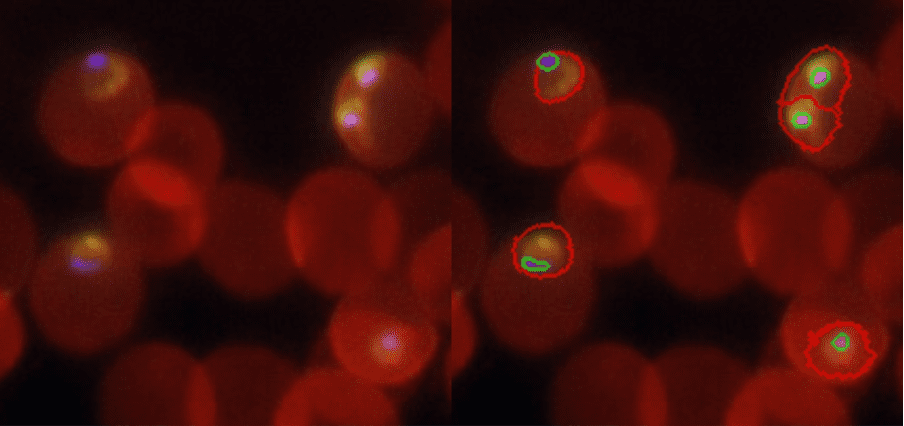- Press Release
LPIXEL Inc. Selected for GHIT Fund Investment as part of Global R&D Collaboration to Accelerate Antimalarial Drug Discovery using AI Image Analysis
The collaborative project “Machine learning-based deconvolution of antimalarial drug mechanisms of action through cell painting of compound-treated Plasmodium falciparum-infected erythrocytes,” co-led by Medicines for Malaria Venture (MMV, Switzerland), the University of Dundee (UoD, United Kingdom), and LPIXEL Inc. (headquartered in Chiyoda-ku, Tokyo, Japan, CEO: Tomihisa Kamada), has been selected to receive investment of approximately JPY 99 million (approximately USD 0.6 million) by The Global Health Innovative Technology Fund (GHIT Fund).
This project utilizes a method called “cell painting,” which leverages images of stained malaria parasite cells to understand the biological impact of compounds. This technique visualizes cellular structures and quantifies their features, enabling rapid identification of a compound’s mode of action (MoA). By applying this approach, we aim to accelerate the research and development of antimalarial drugs.
About the Project:
Malaria remains a significant public health challenge, with approximately 263 million new cases and 597,000 deaths reported in 2023[1]. Furthermore, resistance to the antimalarial drug artemisinin and its derivatives has emerged in Southeast Asia and, more recently, in East Africa, posing a serious threat to the control and eradication of malaria. In light of this, there is a pressing need for the development of new treatments with novel targets that are not influenced by existing resistance mechanisms.
By leveraging cutting-edge parasitology, imaging, and AI analysis technologies, this project aims to develop a cell painting-based compound profiling platform that can rapidly identify the MoA of antimalarial compounds. In doing so, the platform will enable the prioritization of compound series for drug discovery, highlight those with targets not currently represented in the antimalarial development portfolio, and is expected to reduce the time and costs associated with elucidating the MoA of hit compounds obtained from phenotypic screening.
This innovative project is comprised of an interdisciplinary team with expertise in drug discovery, malaria parasitology, high-content imaging, and AI image analysis. The team will focus on developing a method for classifying the MoA of antimalarial compounds by performing phenotypic pattern recognition and clustering based on their biological effect on the malaria parasite. MMV will lead the curation of compounds with diverse MoA to be tested in the assay, while the University of Dundee will optimize malaria parasite cultures, test compounds on them, and conduct high-content imaging and analysis. LPIXEL will utilize this imaging data to develop AI models for MoA classification and implement them on a cloud platform.
Through this project, LPIXEL will apply its expertise in AI image analysis—cultivated through various collaborations with academia and industry to date—to further contribute to the advancement of cellular imaging–based drug discovery.
For further details about the project, please refer to the news story by Medicines for Malaria Venture.
Image:

Caption:
Red blood cells infected with Plasmodium falciparum. Preliminary cell painting data demonstrating detection of parasites (green stain, red circles on right image) and their nuclei (blue stain, green circles on right image) within red blood cells (red stain). Parasites will be exposed to various compounds and then analyzed using AI to enable the clustering of compounds based on their biological effect on the parasite.
About GHIT Fund:
The Japan-based GHIT Fund is an international public-private partnership fund for global health R&D that mobilizes Japanese industry, academia, and research institutes to create new drugs, vaccines, and diagnostics for malaria, tuberculosis, and neglected tropical diseases, in collaboration with global partners.
For more information, please visit https://www.ghitfund.org/en
About LPIXEL Inc
Established in 2014, LPIXEL is a leading provider of artificial intelligence-based image analysis technologies within the medical and life science industries.
Dedicated to improving the lives of clinicians and the health of patients, LPIXEL’s flagship series of Software as a Medical Device (SaMD) products, ‘EIRL’, assists clinicians with the interpretation of medical images including radiological scans (X-ray, CT, MRI) and colonoscopy, and has performed over 12 million analyses to date (as of June 2025).
In addition to clinical products, LPIXEL also accelerates R&D across the life sciences by delivering bespoke image analysis solutions to leading pharmaceutical and medical device companies with a focus on addressing challenges across all stages of the drug development pipeline, from drug discovery to clinical trials.
For more information, please visit https://lpixel.net/en/
About MMV
MMV is a Swiss not-for-profit working to deliver a portfolio of accessible medicines with the power to treat, prevent and eliminate malaria. Born in 1999 to drive health equity, MMV closes critical gaps in research, development and access to expand the use of existing antimalarials and innovate new compounds. As of 2024, MMV-supported products have effectively treated an estimated 711 million patients. For more information, visit www.mmv.org.
Follow MMV on social media: X | LinkedIn | YouTube | Facebook
[1] World Health Organisation (2024) World Malaria Report 2024 Available at: https://www.who.int/teams/global-malaria-programme/reports/world-malaria-report-2024 (Accessed 19 February 2025)